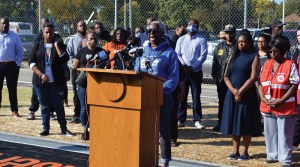By Ana Martinez-Ortiz

“We will not be shut down, we will not be sat down, and we will not be silenced,” Arnitta Holliman says. “What we are saying is everyone else in this community needs to do the same: stand up, speak up and be with us in this work.” (Photo by Ana Martinez-Ortiz)
Last week, Mabel Lamb, the executive director of the Sherman Park Community Association, along with others from the Sherman Park neighborhood, walked along West Burleigh Street and North Sherman Boulevard with the District 7 police captain and community liaison officers. The group was looking at the places where there had been homicides and non-fatal shootings.
“There are over 31,000 residents that live in Sherman Park [and] we deserve a safe neighborhood,” Lamb said. “What I am going to ask the community is this: Put the guns down. We need peace. We need to be able to live in our communities safely.”
Lamb, along with other community leaders, spoke at a press conference hosted by the City of Milwaukee Office of Violence Prevention in Sherman Park, 3000 N. Sherman Blvd., on Wednesday, Oct. 6. The group responded to the recent increase in violence taking place across the city including one situation that left a young girl dead and her sister injured.
Arnitta Holliman, the director for the Office of Violence Prevention, said the press conference was a show of support for community members and to remind the city that people are doing the work to prevent violence and interfere when violence is present.
“This isn’t just a job we show up for to collect a check,” Holliman said. “We are here to heal ourselves and to heal our community. And we need everyone’s efforts and everyone’s support for that.”
This work cannot be done alone, she said. It requires effort from the people doing the work to those who determine the budget to ensure that there are adequate resources to address the issues.

Reggie Moore says, “It’s not just on programs to solve this problem, this is on all of us who live and care about the City of Milwaukee to solve this.” (Photo by Ana Martinez-Ortiz)
Reggie Moore, the director of Violence Prevention Policy and Engagement at the Medical College of Wisconsin, spoke during the press conference on the historic level of violence taking place in Milwaukee.
Often times elected officials say there is not enough resources to fund after school programs or primary prevention, Moore said. He noted that there is an unprecedented opportunity through the city budget and American Rescue Plan Act funding to invest in prevention.
Moore noted that sometimes people will question why there is another press conference. A press conference is statement of unity and commitment, he said, and it shows that the preservation and safety of life is something of a concern for everyone.
Young people are often blamed for the violence, but it is not solely a youth problem, he said.
“We don’t have a youth gun violence problem; we have a gun violence problem,” Moore said. “When a 75-year-old man shoots his 49-year-old son that is a gun violence problem.
If we care about our young people, we can’t just care about them when they’re in trouble. We have failed our young people in responding to this pandemic and investing resources in their recovery and the recovery of families that were already struggling before the pandemic.”
Moore encourages everyone to take action when it comes to addressing violence in the city.
“The work begins now,” Moore said. “It’s not just on programs to solve this problem, this is on all of us who live and care about the City of Milwaukee to solve this.”

“We are here to highlight the struggle,” TeAngelo Cargile Jr. says. “And we are here to highlight the solution.” (Photo by Ana Martinez-Ortiz)
TeAngelo Cargile Jr. is the Youth Injury and Violence Prevention coordinator for the Office of Violence Prevention.
“When I think about our young people, I think of hope,” he said. “I think of the future. I see our future leaders and I am proud of who they will become. I also recognize that some of our young people are on a path that is difficult. A path where they didn’t receive healthy support and we are here to say we see you and we are here to support you.”
Gun violence or exposure to gun violence impacts children physically, emotionally and socially, Cargile said. He noted that there is also community trauma, which is the sum of individuals who have experienced trauma, that can manifest as a collective trauma in neighborhoods with increased violence.
“The peer-to-peer violence that is currently happening isn’t what our city needs or deserves,” he said. “It is imperative that healing is centered on serving youth and families impacted by violence.”

“If you are involved or engaged in anything that will create violence, please seek help,” Mabel Lamb says. (Photo by Ana Martinez-Ortiz)
Cargile said action is being taken in the right direction through avenues such as the Blueprint for Peace, the Cream City Credible Messengers and the coalition, Beyond the Bell.
Additional speakers at the press conference included Bria Grant of Crime Stoppers; Chaz Fortune, Youth Advocate Program director and Credible Messenger supervisor; David Muhammad, deputy director for Milwaukee County Department of Health and Human Services; Derrick Rogers, director of 414 Life Violence Interruption; Vaun Mayes, founder of Community Task Force Milwaukee; and Simmone Kilgore, a trauma therapist.
“We are here to highlight the struggle,” Cargile said. “And we are here to highlight the solution. Everyone who is hearing me has a role in violence prevention. When we continue to see ourselves as the solution, we will get closer to the Promised Land.”




